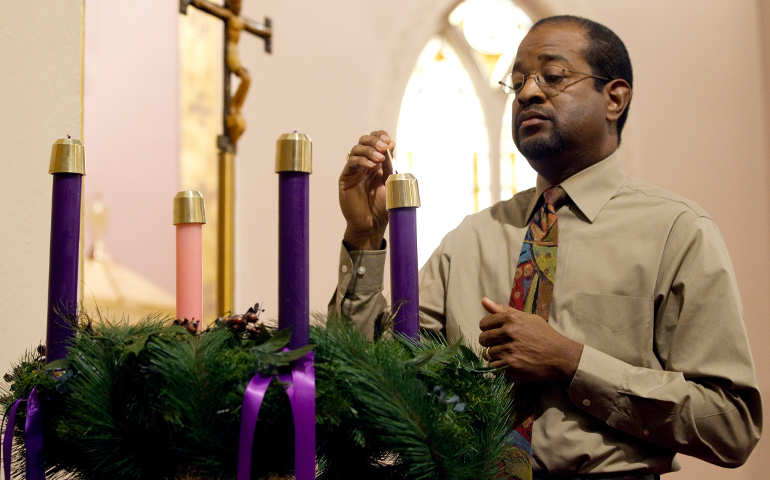
Lighting the Advent wreath on the first Sunday in Advent. (CNS file photo 2011)
Third-Isaiah, Paul and Mark are concerned with God entering our lives in a unique way -- something around which the coming celebration of Christmas revolves. Yet each writer has his own unique place in salvation history, outside the context of that specific, 2,000-years-ago Bethlehem event.

| First Sunday of Advent |
| Isaiah 63:16b-17, 19b, 64:2-7 Psalm 80 1 Corinthians 1:3-9 Mark 13:33-37 |
Third-Isaiah, for instance, is addressing Israelites recently freed from their 50-year Babylonian exile. Though the prophet encourages his people to return to the Promised Land, he's convinced that rebuilding physical structures only makes sense after someone is first committed to rebuilding a relationship with Yahweh. No one will notice God breaking into their lives until they first become the people of God.
Awareness of God's actions in our lives is also at the heart of today's 1 Corinthians pericope.
Casual readers of this passage might miss Paul's sarcasm. The apostle is thanking God for all the gifts of the Spirit this particular community received since it committed itself to imitating Jesus' dying and rising. But once we get into the letter itself, it becomes clear that some in the Corinthian church are employing their gifts in ways that are tearing the community apart instead of building it up.
Unlike Third-Isaiah's listeners, the apostle's readers don't have to pray for God to enter their lives. God's Spirit is already present and working, though some in Corinth aren't working with the Spirit.
Like all first- and second-generation Christians, Paul believes Jesus' second coming isn't far down the road. His early letters clearly convey his conviction that it will happen in his lifetime. But though Jesus' arrival is imminent, Paul insists that these other-Christs have lots of work to do before the Parousia breaks into their lives. Being found "irreproachable on the day of our Lord Jesus Christ" isn't automatic.
Mark writes about 10 years after Paul's martyrdom, yet he still presumes Jesus will return in his and his readers' lifetime, even if he's taking a long time doing it. He simply wants everyone to be in his or her place, doing exactly what the returning Jesus expects them to do.
To get his point across, the evangelist uses the twin images of being asleep or being awake; being conscious or being oblivious to what's happening around us.
The key virtue for Christians around the year 70 is simple: "Be watchful! Be alert!" Be doing what Jesus expects you to do when the door of the Parousia suddenly opens.
Twenty centuries later, when most followers of Jesus no longer expect his imminent return, alertness still remains a key virtue. During his earthly ministry, Jesus was driven to share his insight that God was present and effectively working in everyone's life. His preaching revolved around making others aware of God's kingdom among them, making them alert to a presence most people never seemed to notice. But he insisted that his followers travel a unique road to find that presence.
Biblical faith isn't a matter of just slavishly obeying specific rules and regulations; it's much more a matter of living up to the responsibilities we've assumed because we've entered into relationships with the living God and those around us. No parent, for instance, when speaking about staying up all night with a sick child, would say he or she did so because a particular law commanded them to act that way. They do it because of the responsibilities they assumed when they became parents. Relationships dictate a Christian's actions, not a set of regulations. Only relationships can change the world in which we live.
In one of the last scenes in the classic movie "The Mission," a Portuguese South American governor tries to rationalize his country's massacre of a community of Jesuit missionaries and the indigenous people to whom they ministered by saying, "We must work in the world; the world is thus." But the papal legate who's having second thoughts about approving the slaughter responds, "No, thus have we made the world. Thus have I made it."
Paul obviously believes that the Spirit gives the followers of Jesus certain talents that, if employed properly, can transform us into the body of Christ. Yet he's also realistic enough to see that if we're not alert to the needs of others, we'll sidetrack those gifts and use them for our own benefit -- not theirs -- and eventually make our world a worse place in which to live instead of a better one.
Perhaps such a reflection will help us approach this Advent with a biblical perspective. Events like Christmas become more significant if we celebrate them against the background of relationships. It's there we're most conscious of God's presence.
Jesus and his first followers would have agreed with that old bumper sticker: "Be alert! We need lots of lerts." We certainly do.
[Fr. Roger Vermalen Karban is pastor of Our Lady of Good Counsel Parish in Renault, Ill.]
